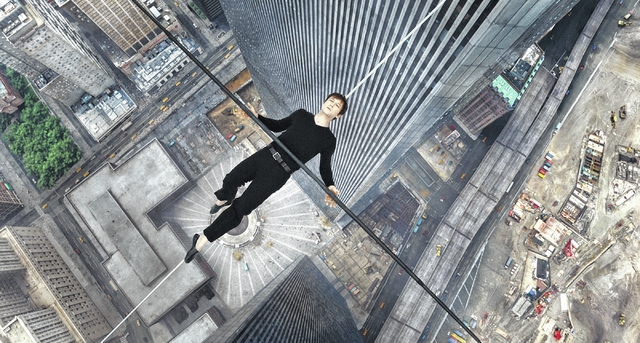If for whatever reason you need to see “The Walk,”here’s my advice: Buy a ticket and then hang out in the lobby for about 80 minutes. Seriously, do not enter the theatre. Just find a box Sweetarts, play a couple rounds of that Batman video game where you scoot around in the Batmobile and, if time permits, try to put the moves on whoever is tearing tickets at the front. Don’t be shy. You paid to get in here. They’re trained for this. Man or woman, they’re expecting you to be the grossest you that you can be. When the 80 minutes are finally up, enter the theatre with your head held high and prepare yourself for a fun little heist movie capped off by one of the most beautifully harrowing and immersive experiences ever captured on film. But if you enter that theater a moment sooner, be warned that whimsy will immediately knock you onto the ground, hold you down and cram quirkiness down your throat. Understand that for most of its running time “The Walk” is “Amelie” for dudes in man-buns who are rarely seen without their acoustic or a pair of flower sticks. It’s just insufferable.
Although based on the memoirs of the film’s subject Philippe Petit, “The Walk’s” true reason for existing is the Oscar winning 2008 documentary “Man on Wire” that unlike this movie is an unbiased account of Petit’s 1974 high-wire walk between the Twin Towers. “Man On Wire” wasn’t afraid to portray Petit as a pissy, pretentious megalomaniac. “The Walk”, on the other hand, sees Petit as a sprightly rogue, a full time dreamer whose – quite frankly – stupid aspirations overrule the fact that he didn’t see a problem with intentionally running over people’s toes with a unicycle after they committed the unspeakable crime of wanting to get a closer look at his tired mime act.
There’s simply too much preamble in “The Walk” and any movie where Joseph Gordon-Levitt insists on speaking with an obscenely Pepe Le Pew-ish French accent needs to get to the point as quickly as possible. But “The Walk” doesn’t. Before we can get to the main attraction we have to suffer through endless scenes of Petit staring wistfully at high wires as a concertina loudly wishes us harm in the background, Petit jumping into various “caraaazy” disguises and Petit repeatedly treating the people around him like garbage because they can’t grasp the unbridled majesty of having a quirky death wish. The grating magical realism of “The Walk” and a sense of its period that shares the superficiality of those old ads for Time-Life music comps, which seemed to run on an endless loop on every cable channel throughout the 90s, only exacerbates matters.
But once there, “The Walk” finally develops into something interesting partly because Levitt manages to keep his phony Gallic lips shut, but mostly because it’s hard not getting swept up in Petit’s stunt. Once Levitt steps on that wire, you’re right alongside of him. Whatever you feel about Petit or Levitt’s portrayal of Petit, you’re holding your breath and, amazingly, rooting for this smug prick not to fall. Unlike the rest the movie, this sequence is lean, suspenseful, poignant and – outside of a moment involving an inquisitive seagull- bereft of the cutesy-poo nonsense that infects the rest of “The Walk.” Existing as the number one and possibly only argument for the use of CGI in film today, Petit’s high wire act is literally the only reason to watch “The Walk.” There’s nothing else to see (unless you want to look at Ben Schwartz in an unconvincing Ron Jeremy mustache). In fact, there’s so little to see here, here’s another warning, the moment Levitt steps off the wire and onto the relative safety of the roof of the World Trade Center towers, start collecting your coat and hat as you quickly make your way out of theater. Otherwise you’ll be inflicted with Petit’s insincere tribute to the Twin Towers that he somehow manages to make about himself. To Petit the loss of the World Trade Center buildings means he can no longer use his free lifetime pass to visit the observation deck and psychologically masturbate to that one time in his life when the world paid vague attention to him and his fleetingly interesting circus antics.
That sound you hear, is a million hearts all bleeding at once for this wonderful, beautiful, terrible little man.




